By Rocio Granados - La Voz Catolica

Photographer: CORTES├ŹA
This year's group of students in SEPI's Spanish Language and Culture course pose outside downtown Miami's historic Gesu Church, one of their stops on their cultural outings throughout the city. Posing in front are Paul George, Miami's historian, with Lydia Hoyo, one of the course's teachers. Another teacher, Juan Jose Rodriguez, is in the back row, wearing a striped shirt.
MIAMI | “I like how you say ‘popcorn’ in Spanish: rositas de maíz,” said Natalie LaFleur, who learned the words during the Spanish Language and Culture immersion course offered by the Southeast Pastoral Institute (SEPI).
The three-week course, which concluded July 2, incorporates language learning with cultural experiences, and took LaFleur and her classmates to some of the most emblematic spots that reflect Miami’s multiculturalism.
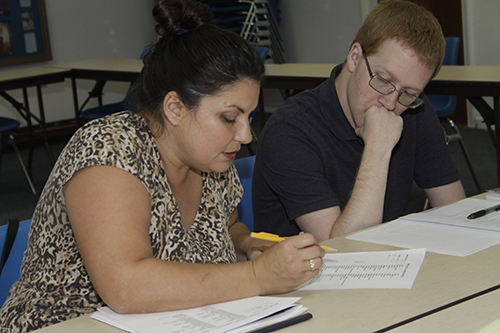
Photographer: ROCIO GRANADOS
Natalie LaFleur, director of faith formation at St. Joseph Parish in Stuart, is shown here during one of the daily language classes that are part of SEPI's three-week Spanish Language and Culture immersion course.
“In my parish the children speak English and their parents speak Spanish. It’s not fair that the task of translation falls (always) on the children,” said LaFleur, director of faith formation at St. Joseph Parish in Stuart, a community with a largely Hispanic population in the Diocese of Palm Beach.
“I want to be able to speak the language,” she said. “Sometimes the parents want to talk with me. I want to communicate directly with them, too.”
LaFleur, who also leads Bible courses at St. Joseph School, married a Frenchman and lived for a while in Italy, but never had a direct encounter with the Spanish language until she started the SEPI immersion course.
The three-week program, offered every summer, is aimed at those involved in pastoral ministry to Hispanics. SEPI is the educational arm of the U.S. bishops’ Southeast Regional Office for Hispanics, which is based in Miami and serves dioceses in nine states of the southeastern U.S.
Fourteen students from Pennsylvania, South Carolina, Florida and Texas, a combination of priests, deacons, seminarians and laypersons, attended this year’s course, which covered more than the language.
“We immersed ourselves in the culture,” said Stephen Colella, cabinet secretary of Parish Life at the Archdiocese of Miami.
SEPI has been offering the course for more than 30 years because “we are convinced that we need to understand the immigrant in the language that the immigrant needs at that moment,” said Juan Jose Rodriguez, the professor who runs the program.
“The purpose of this course is to have pastoral ministers who are capable of carrying out that mission,” Rodriguez added.
Although the course is designed for beginners, many of the students already have a certain amount of knowledge of the language. Realistically, it is impossible to learn a new language in three weeks. But that’s not the ultimate goal of the course.
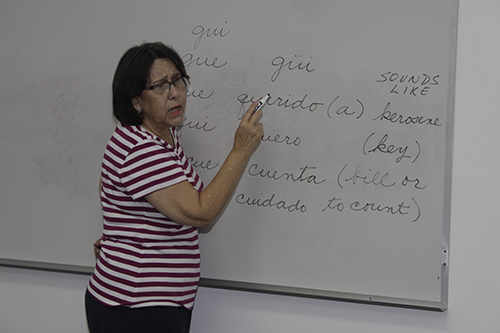
Photographer: ROCIO GRANADOS
Lydia Hoyo teaches pronunciation during one of the daily Spanish language classes that are part of SEPI's annual summer immersion course in Spanish language and culture.
“What I can say is that a priest who doesn’t know a word of Spanish can (after taking the course) celebrate Mass in Spanish and be understood, and if they have someone who can translate a small homily, they can read their homily and they can do a good job,” Rodriguez said.
For many students the first week is very difficult, but by the second week, “a new language awakens,” he added.
The course runs daily, from morning to night, with the students invited to live in the SEPI retreat house.
“General classes are given in the morning and afterwards we celebrate Mass, generally celebrated by a priest who is participating in the program. After lunch, class is divided into small groups to practice prayers and readings,” said Lydia Hoyos, also a professor at SEPI.
At night, the students are treated to cultural presentations on subjects related to popular religiosity or the different Hispanic groups.
“It is a presentation on how they think, how Mexican Americans live, how Colombians live, how Puerto Ricans live, or how Cubans live,” Rodriguez said.
On weekends, they visit the Shrine of Our Lady of Charity in Miami and tour the city to experience multiculturalism first-hand.
The response to the program has been highly favorable. Each year, the number of students enrolled in the course has remained steady at between 15 and 20. Many of the students recommend the course to others in their dioceses.
“For example, the current bishop of Savannah, Georgia, Bishop Gregory J. Hartmayer, took the course and the bishop prior to him as well. Many years ago, Archbishop John Favalora (archbishop emeritus of Miami) also took the course.”
Taking the classes “has helped me to learn how to prepare my homilies and to understand the cultural background of the persons I serve,” said Father Phillip Tran, who was ordained this May for the Archdiocese of Miami. He was born in California to Vietnamese parents and moved to Boca Raton as a toddler.
With the support of Father Alejandro Rodriguez-Artola, pastor at St. Thomas the Apostle Church in Miami, Father Tran took the course last year when he was a deacon. He never imagined he would be assigned as parochial vicar to Little Flower, in Coral Gables, a very Hispanic parish. At least once a week now, Father Tran celebrates the daily Mass in Spanish.
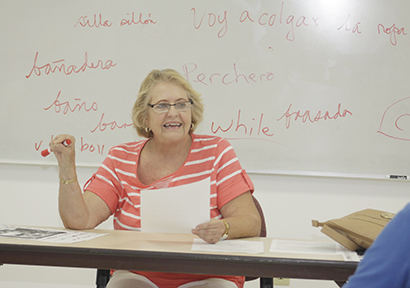
Photographer: ROCIO GRANADOS
Margarita Voigt Poza, a volunteer professor with SEPI's Spanish Language and Culture immersion course, teaches students how to correctly pronounce some eucharistic terms in Spanish.
He visited SEPI while the course was taking place this year to celebrate Mass and support the current students.
He described his experience as very productive, “especially for someone who does not speak Spanish and was going to become a priest for the Archdiocese of Miami, where we have so many cultures and persons from different countries. It is important at least to speak a little to be able to communicate. If you cannot speak anything and you cannot understand, how can you serve when you are needed?” Father Tran said.
He added that what he learned most was “to be patient because, to learn another language, a lot of humility and patience with yourself is a requirement.”
Father Tran said he also learned much about the different Hispanic cultures and people, but the phrase that impacted him the most, and one he uses frequently, is ‘por la gracia de Dios’ (by the grace of God).
“I believe it says a lot about our whole lives. Even during my days learning Spanish, in all that I do, I think that God has helped me a lot, but to celebrate Mass and give my homilies in Spanish, I believe it is ‘por la gracia de Dios’,” Father Tran said.
Ryan Saunders, a seminarian from St. John Vianney Seminary in Miami, took the course this year. He explained that to be a priest in South Florida, Spanish is a necessity.
A native of Fort Lauderdale, Saunders said he is one of the few seminarians who does not have Spanish as his first language or has not been raised bilingually.
“Aside from learning the language, we are learning the history of how the Hispanic church was built in the United States, and how the Hispanic ministry and the Church have grown throughout the years,” said Saunders.
The classes are providing him with a lot of information in a short period of time.
“It is a good base before going to St. Vincent de Paul Seminary in Boynton Beach next year to continue my education, and I am going to take Spanish classes there,” Saunders added.
Living in Miami “is like not being in the United States,” said Father Rafael Lavilla, a priest of the Diocese of St. Augustine who is originally from Manila, in the Philippines. “Here, all that we do, everything is in Spanish,” he said.
Father Lavilla arrived in the U.S. eight years ago and has heard confession and celebrated Mass in Spanish. With the support of St. Augustine’s Bishop Felipe Estevez, a former Miami auxiliary bishop, he took the SEPI course this year to learn more Spanish.
“To understand the culture is to understand the people,” he said. “It is to better understand the faith. Now I believe that I can evangelize more effectively.”
“All of the language, culture, and the form in which it is spoken, is a great part of who (Hispanics) are,” Father Lavilla added. “I am happy to understand that. I also learned how rich the culture is that they bring to the United States. That culture affects not only them but the entire community and the whole country.”
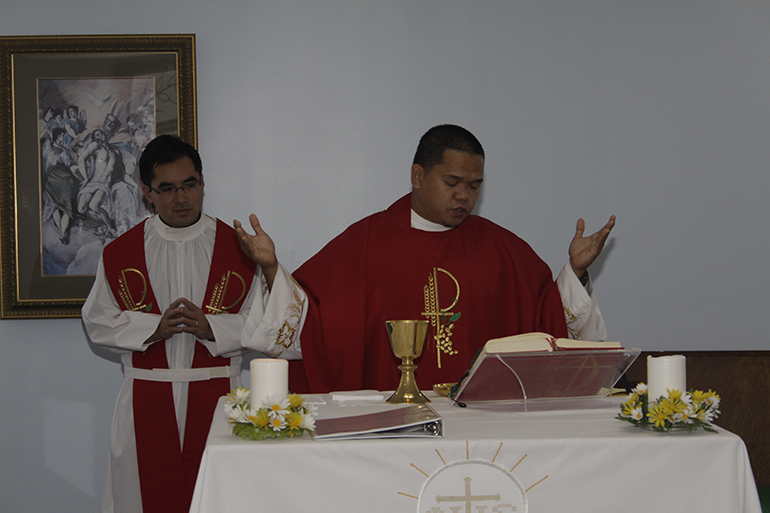
Photographer: ROCÍO GRANADOS | LVC
Father Rafael Lavilla, a native of the Philippines who works in the Diocese of St. Augustine, celebrates the daily Mass in Spanish during SEPI's immersion course in the language and culture. Behind him is Father Phillip Tran, newly ordained for the Archdiocese of Miami, who took the course as a deacon last year.
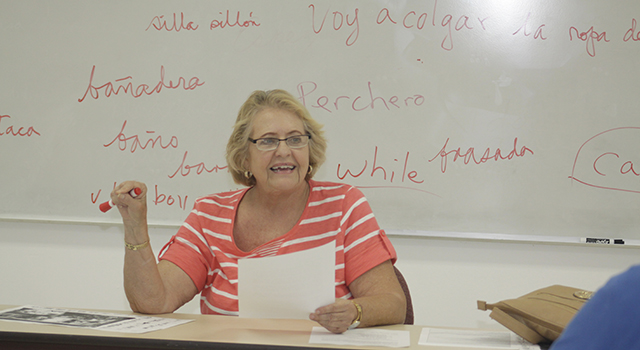

Comments from readers